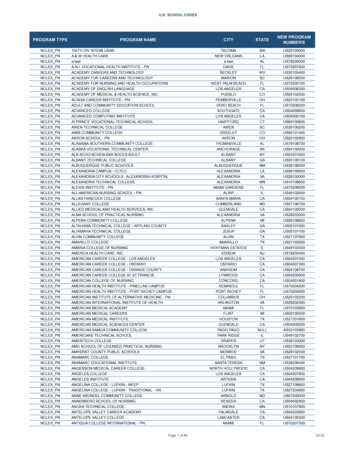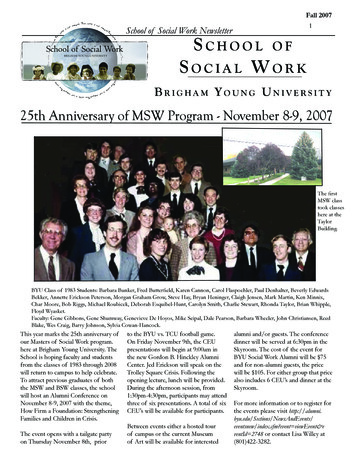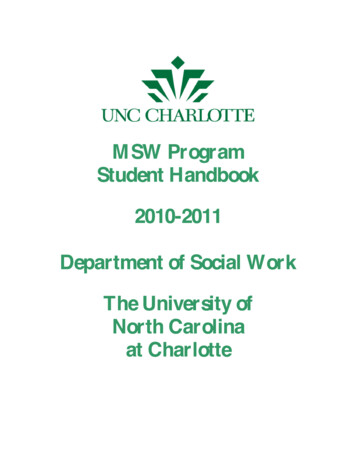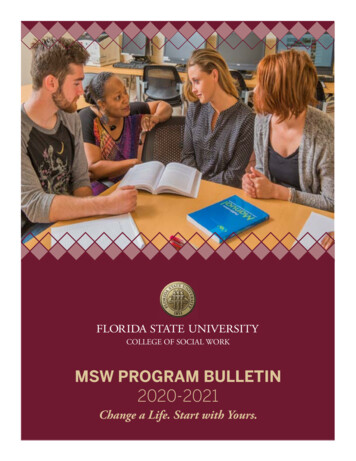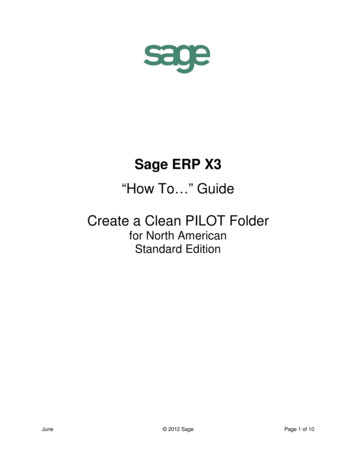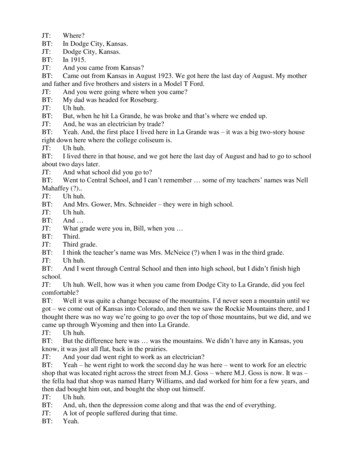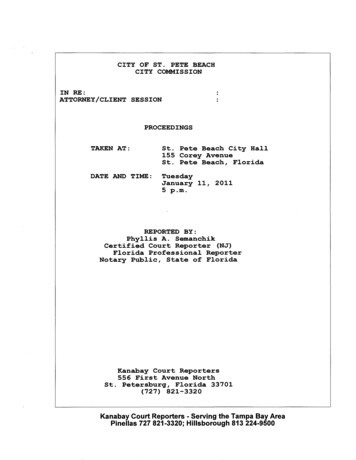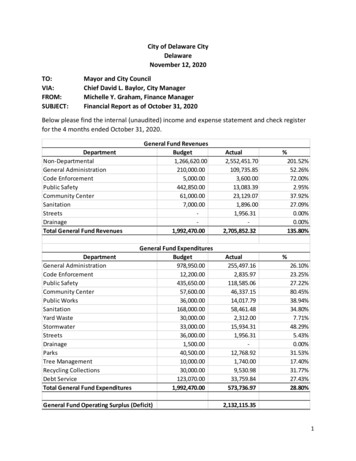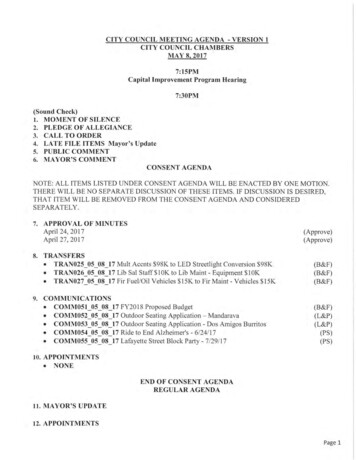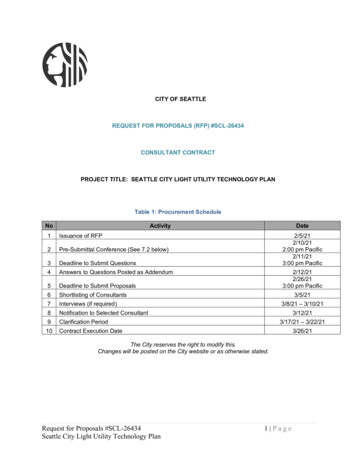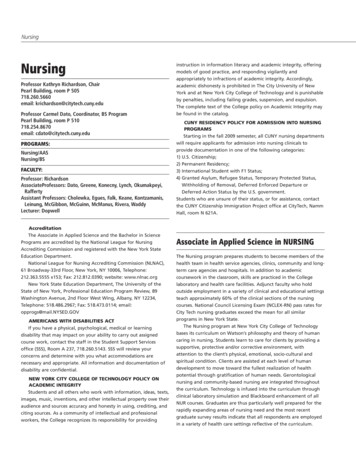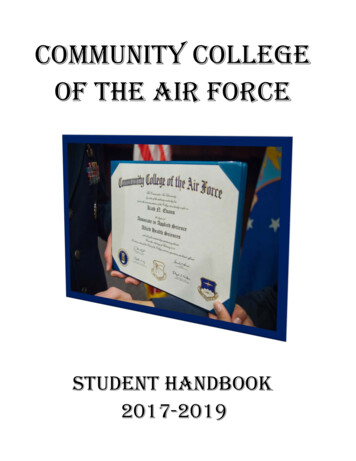
Transcription
Student HandbookMSW ProgramWe strive to be supportive and responsive in helping you cope with the academic,personal, and internship demands of graduate school. This support begins bymaking certain you know how to locate the wide variety of resources available to you.As graduate students and beginning professionals, you are responsible for familiarizingyourself with all School policies, procedures, guidelines, and program requirements.The Student Handbook and School policies are available on the SSSWwebsite. Please check the website regularly for important, up-to-dateinformation: sssw.hunter.cuny.edu.Updated 20171
The Silberman School of Social Work at Hunter College2180 Third Avenue, New York, NY 10035212-396-7500sssw.hunter.cuny.edu2
Table of ContentsMission Statements & Goals . 71. The MSW Program . 9Overview . 9Programs of Study – Pathways to the MSW Degree . 9Change of Degree Pathway . 112. Curriculum of the MSW Degree Program . 12CSWE Core Competencies & Practice Behaviors: Clinical Practice . 12CSWE Core Competencies & Practice Behaviors: Community Organizing, Planning &Development. 15CSWE Core Competencies & Practice Behaviors: Organizational Management & Leadership . 18Method Concentration . 21Change of Method Concentration . 21Additional Program Requirements . 21Attendance Requirements . 23Summer Session . 23Fields of Practice Specialization . 233. The One-Year Residency Program (OYR) . 25The OYR Program: Overview . 25Time Frame I: Part-time Evening Courses . 25Time Frame II: Residency Year . 25Time Frame III: Finishing Up . 274. Field Practicum. 28Field Practicum Overview . 28Field Practicum Policies. 355. Field Advising . 41Overview of the Field Advisor’s Role and Responsibilities . 41Group and Individual Advisement . 41Evaluation of Student Performance. 42Handling Field Performance Issues . 42Student Evaluation of Field Advisors . 44Student Concerns with the Advising Process. 44Second-Year Placement Planning . 45Other Pertinent Issues . 456. Academic Advising . 473
7. Student Evaluation of Faculty Performance . 488. Academic and Professional Performance . 49Essential Abilities and Attributes for Students at SSSW and in Professional Practice . 499. The Grading System . 54Honors . 54Credit. 54No Credit . 54Letter Grades . 55Incomplete . 55Attendance Requirements . 55Grading Systems . 5610. Appeals and Reviews . 57Grade Appeals Process. 57Academic, Ethical, and Professional Conduct . 58Academic and Field Competencies . 59Students Experiencing Difficulty Mastering Practice and/or Professional Competencies . 61Performance Improvement Plan (PIP) Procedures . 61Exceptions to the Performance Improvement Plan. 61Educational Review Committee (ERC) . 62ERC Procedure. 62Possible Recommendations . 62Dismissal Appeal Procedure. 6311. Academic Standing . 64Change of Status . 64Change from Full to Reduced Program Status . 64Leave of Absence . 64Readmission . 65Withdrawal . 6512. Student Government and Committees . 66Common Time . 66Student-Faculty Senate . 66Committees with Student and Faculty Membership . 66Board of Student Representatives and Student Alliances . 6713. Communications . 68Emergency Contact . 68Bulletin Boards . 684
Telephones . 68Communication with Faculty . 69Communication with Advisors . 69Official Facebook Page . 69Other Official Links . 6914. Post-Graduate Resources . 70Licensure Supports and Resources . 70Employment-Related Services . 7115. Supports for Learning . 72The Hunter College Libraries / The Social Work & Urban Public Health Library . 72Accessibility Services for Students . 73Computer Laboratory. 74Audio Visual Resources . 74The Silberman Writing Program . 74Hunter College Reading/Writing Center . 74Additional Student Supports . 7516. Registration and Financial Aid . 76Records and Registration . 76The Registration Process . 76Registration . 76Registration Waitlist. 77Tuition Payment . 77Refund Policy . 77Transfer, Waiver, and Prior Graduate Credits . 77Instructions for Application to Transfer Credits . 77Courses Subject to Waiver or Transfer . 78Financial Aid and Scholarships . 79The New York Higher Education Services Corporation Loan . 79Eligibility for Student Loans . 79Student Loan Deferments for Past Loans . 7917. Liability Insurance, Health and Counseling . 80Liability Insurance . 80Health Services and Wellness Education . 80Health Insurance . 80Counseling Services. 80Hunter College Behavioral Response Team . 8018. Facilities . 81The Building . 81Hours of Access . 81Restrooms . 815
Room Requests . 81Food Service . 81Smoking. 82Building Operations . 82Fire Drills . 82Fire/Emergency Procedures for Students with Disabilities . 8219. Finishing Up . 83Preparation for Graduation . 83Appendix A: Required Courses and Program ModelsAppendix B: Student Rights and College PoliciesAppendix C: Faculty and Staff DirectoryAppendix D: NASW Code of Ethics and Standards and Indicators of Cultural Competence6
SILBERMAN SCHOOL OF SOCIAL WORK MISSION STATEMENTThe Silberman School of Social Work at Hunter College (SSSW) educates and trainsoutstanding social work professionals, who are lifelong learners engaged inknowledgeable, ethical practice with communities locally and nationally. Guided by thismission, we are uniquely committed to social work excellence in the public interest. Ourclassroom curriculum, practicum experiences, and community-engaged partnerships arefocused on supporting persons, families, organizations, and communities, whilerespecting the humanity of all individuals.MSW PROGRAM MISSION STATEMENTThe Silberman School of Social Work MSW Program is committed to educating ethical,culturally competent social workers to build community partnerships and strengthencommunity capacity to achieve social justice in diverse, urban communities. This missionpromotes the creation, transformation, evaluation and assumption of leadership roles inservices across systems to meet the complex and unmet needs of underserved andunderrepresented populations through community-engaged education, intervention,research, and advocacy.MSW PROGRAM GOALS To graduate excellently prepared and diverse social work practitioners for NewYork City and other major urban areas who use a range of interventions withindividuals, families, groups, organizations, and communities, and who operateout of a strengths-based perspective and resiliency framework; To emphasize urban contexts in the person-in-environment perspective,particularly as it relates to preparation for employment as clinical practitioners,community organizers and social services organization leaders; To develop life-long learners able to respond innovatively to emerging practicechallenges in an ethical and research-informed manner; To produce culturally competent social work practitioners and community7
engaged scholarship and practice-based research; To instill a commitment to social and economic justice that produces graduateswho skillfully and assertively advocate on behalf of clients and causes; To educate students in partnership with New York’s communities, agencies, andorganizations to promote the expansion and dissemination of effective sociallyjust practice.The School is fully accredited by the Council on Social Work Education.8
1THE MSW PROGRAMOverviewThe Silberman School of Social Work at Hunter College (Silberman, SSW, SSSW, or “theSchool”) adheres to the principle that social work education is based upon a common coreof practice values, skills, and knowledge that result in professional competency. The MSWcurriculum at the Silberman School of Social Work reflects a commitment to human rights,cultural complexity, and social and economic justice. The curriculum includes HumanBehavior and the Social Environment, Social Welfare Policy and Services, Social WorkPractice Methods, Social Work Research, the Field Practicum, and the Professional Seminar.Students are required to take a year-long Social Work Practice Learning Lab and to selectone of three practice methods: Clinical Practice with Individuals, Families, and SmallGroups; Community Organizing, Planning and Development; or OrganizationalManagement and Leadership.In addition, the SSSW requires Second-Year Full-Time, Time Frame II One YearResidency, and Accelerated students to choose a specialization in a Field of Practice(FOP). As a reflection of our commitment to social justice and human rights ,the nature ofthe service systems where we do our work, and contemporary issues in social workpractice, the school has chosen the following four FOP specializations: Aging Child Welfare – Children, Youth and Families Health and Mental Health (a sub-specialization in World of Work is available) Global Social Work and Practice with Immigrants and RefugeesThe School has strong ties to many social agencies whic
Programs of Study—Pathways to the MSW Degree The Silberman oSchool of Social Work ffers several pathways leading to the Master of Social Work degree.(MSW) Two-Year, Full-Time Program (TYP) The Two-Year, Full-Time Program (TYP) is designed for students who can
